Even twenty metres up in the canopy, the night air is hot and still. My eyelids are heavy and scratchy as I blink, checking my watch for the hundredth time. It's a little past two in the morning.
Someone’s snoring slightly on the other side of the platform. I wriggle slowly and cautiously, trying to find a spare inch of space to move my leg. There are four of us trying to sleep on one single mattress, under one single mosquito net. My partner, heroically, is covered in DEET and attempting to sleep on the bare wooden bars of the treehouse floor. From the sound of him rolling about, he's not having much luck.
We should have seen this coming.
“No no, you don’t have to pay for all of you!” the man had assured us. I’d watched my partner's eyebrows climb up his head in surprise. Ghana is not famous for its freebies. “Just the adults pay.”
As we'd then been led through the rainforest to the treehouse with its 15 improbably arranged beds, with 14 people already getting ready to get in them, the penny dropped. Suspicions warranted. And now we find ourselves here – tessellated in the dark. Not getting a wink of sleep.
Or at least us adults aren't. Other than speaking occasional parts of their dreams (this evening, mostly about blue trees with rainbow wood), the children have turned off like lights. They’ve become completely unconscious of the heat, the lack of space, the mosquitoes, and the nearby edge of the platform and the long drop to the forest floor. I, on the other hand, have not.
Why?
Many WEIRD adults don’t sleep well
Anyone who’s ever carried a sleeping child from car to bed knows that most children can sleep more deeply than most adults. And for a good evolutionary reason - adult brains need to be more wake-able to respond to night-time dangers.
But in our Western, Educated, Industrialised, Rich, and Democratic (WEIRD) cultures, it goes much further than that. One in three WEIRD adults has sleep problems on a weekly basis, and one in ten of us meet the medical definition of insomnia.
In contrast, traditional equatorial societies have a prevalence of chronic insomnia of just 1–2%. Some communities don’t even have a word to describe it.
So what is it about WEIRD adults that makes us sleep badly? The NHS lists a number of factors:
Internal factors
stress, anxiety and depression
alcohol, caffeine or drugs
Time-perception factors
jet lag
shift work
Sleep-environment factors
noise
a room that’s too hot or cold
uncomfortable bed
That's not a bad list. Let's give it a bit more detail:
Internal factors: We know that our WEIRD culture is unnaturally stressful, and that mental health diagnoses are soaring. That’s no surprise.
And I’ve talked before about our WEIRD addictability - both legal and illegal addictive drugs damage sleep. It won't surprise my readers to learn that sugar had a role amongst the other psychoactive drugs: there are studies linking sugar-sweetened beverages (without caffeine, obviously) to insomnia. As I’ve mentioned in previous articles - fructose (half of the molecule that we call ‘table sugar’) produces a ‘hyperactive foraging state’, helping us to seek more food to store rather than to use. Hyperactively foraging is counterproductive for sleep.
Time-perception factors: Jet lag and shift work are problems of industrialisation, but there are plenty of other circadian disruptors. There’s a lot of evidence, for example, linking excessive smartphone use with insomnia - often because people using smartphones in the evening go to bed later (and are motivated to check their phones whenever they wake).
Sleep-environment factors: This final category is a well known “one weird trick” that shocks no one. We all know that we'll sleep better in a cooler room.
The thing is that excitement, caffeine, and smartphones are now commonplace in many non-WEIRD communities (as are really really warm sleep environments, sometimes on rickety wooden platforms 20 metres off the jungle floor). So why is insomnia still so rare?
Traditional cultures set children up for lifelong good sleep
Nearly all animals sleep. It is a required period of maintenance and growth. Reduced sleep impacts our fitness, strength, immunity, development, decision making and ability to learn. Babies and children need all of these things dialled up to 11, so nature makes them sleep very deeply. Maybe not for particularly long. But very deeply.
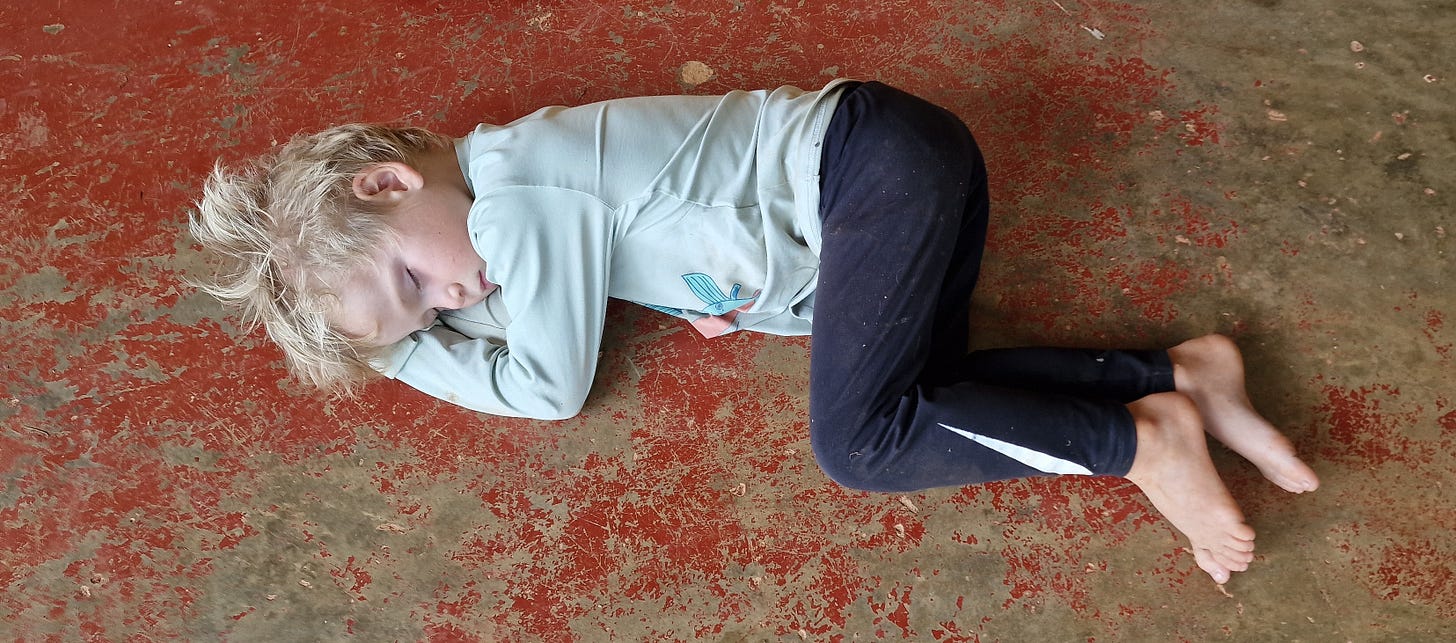
To do this, the brain strongly filters out stimuli that might wake them. Things like noise, light, discomfort, etc. to keep sleeping. Slowly, as babies turn into children and then into adults, that massive need for sleep reduces, so the body turns down the filtering accordingly, so they get to wake up and enjoy life.
It's at this point that learning comes into play. In trying to find the right level to set that filtering, the body reacts to the stimuli around it. In uncomfortable, disturbed environments, the body learns that it shouldn't drop the filtering very far. In dark, quiet, soft environments, it learns that a good night's sleep (not too little, but also not too much) is achieved by turning the filtering really really low.
And that's where the filtering stays from then on. (NB There's very little evidence about the efficacy of retaining this level of filtering in adulthood. I'd be very surprised if it was impossible. But I would also be very surprised if it was easy). Growing up with a ‘perfect' WEIRD sleep environment creates adults who struggle to sleep with anything else. Picky sleepers.
This doesn't happen outside of WEIRD cultures. When living in traditional communities, we saw kids asleep on mats at the edge of a loud party. We saw kids sleeping on cool concrete floors, in the shade of a tree, or on their mother’s backs.
And that ability persists into adulthood. In many cultures (including very strongly in Ghana where it took me by surprise) sleeping is an ‘any time, any place’ activity. Is the maize mill deserted? No, the two women that work there are just curled up asleep because there were no customers. Is the guy lying on the side of the road passed-out drunk? Nope, he's asleep while he's waiting for his bus. There is, in most places, no shame in sleeping.
Think about when your child has fallen asleep in just such a situation. Did you think about the evolved mechanisms that were helping her learn to sleep in old age? Or did you just smile at her inability to stay awake?
WEIRD culture makes it hard for us to learn to sleep as children.
We WEIRD parents don't deprive children of noisy, variable, mildly uncomfortable sleep environments to deliberately curse them with a lifetime of picky sleeping. We do it for two reasons:
We don't have the support we need when we’re trying to survive the first few months of a child’s learning to sleep properly. They wake up a lot. We're isolated, working two jobs, without a second to nap and catch up on sleep after a hard night.
We have a massive cultural taboo around discomfort. It's almost mandated that we need to enforce ultimate comfort upon children at all times: soft mattresses, supportive pillows, air conditioning or heating, white-noise machines, blackout curtains, and closed doors so that no uncomfortable variability creeps into the system from outside. Anything less makes us feel like bad parents, despite the huge long-term benefits we're creating.
Sleeping like a baby
The post you're currently reading is about how to set up children to sleep well as adults. In this linked post, I write about what children need to sleep well in childhood, and what we can learn from traditional cultures to help them sleep better.
The other cultural taboo that is getting in kids’ way when it comes to learning to sleep is room sharing. The assumed default is that families who can afford it should give each child their own room, and certainly no child sleeps in their parents’ room. The result: We don't get to watch adults sleeping as children. Which is sad, because horror film scenario or not, this is a way many kids in traditional communities get to model deciding to go to sleep or returning to sleep after waking. Really, really important life skills. The sort of thing it's probably important to watch and mimic?
The net effect of all these well-meaning provisions and situations is that we grow children who have developed a very fragile relationship with sleep. Their needs to enable sleep are much more complex than nature intended. At least when they are children, that deep sleep of childhood masks the problems to a certain extent. Sure, maybe they keep leaving their solitary rooms in search of company, or maybe they are compulsively activating the Alexa before they go to bed, but in general, their brains are still switching them off fairly reliably.
The problems come when the lighter adult sleep sets in. Especially as adults get older and their sleep patterns change. Suddenly then they find that they can’t create an environment that is perfect enough to allow them to get the sleep they desperately crave. Nothing is easy enough for them to switch off. But some of that was set decades ago. They weren’t set up to learn to sleep easily when sleep came easily. They missed the boat.
We need to make child sleep more difficult so adult sleep is easier
OK. To help our children sleep better in adulthood, we need to make sleep harder for them in childhood. This goes against every WEIRD instinct we have, but we should try.
So what can we do?
Babies
Most traditional cultures have mothers and babies sharing a surface for sleeping. If you’re breastfeeding, bedsharing improves your likelihood of being successful, and the risk of SIDS is much lower with breastfeeding than with formula feeding. Have as firm a mattress (or use a futon) as you can and avoid pillows. Oh wait, am I suggesting that your own sleep thresholds affect your baby’s…? There’s definitely a generational thing going on here.
Keep it unpredictably noisy. Don't whisper and tiptoe. Let your baby's brain calibrate to a reasonable level of noise.
You know how advice on cots tells you to avoid duvets and pillows? Definitely avoid duvets and pillows. If the cot mattress is soft, consider cutting a yoga mat to size and using it as a firm mattress topper. Soft mattresses immobilise children’s bodies during sleep in a way that bodies have not evolved to cope with in the long term.
Do everything you can to avoid allergies. Allergies really screw with sleep. If your child has an allergy, use air purifiers and non-drowsy antihistamines (confusingly, the drowsy ones also screw with sleep.
Children
Avoid heating or cooling the room air as much as possible. Children sleep in different positions when they are hot or cold, and their bodies learn how to deal with different temperatures.
Don’t introduce a pillow. Children who sleep without a pillow stretch their neck and upper body more during sleep, they are more likely to have their mouth closed, and they get used to adjusting to mild discomfort.
Avoid mattresses - yoga mats or futons help kids learn to sleep on firm surfaces so their growing bodies aren't immobilised in sleep. An electric mattress topper keeps them warm in the winter.
Keep kids together in the same room for as long as possible. Not only does it help them learn to sleep through disturbance, but also bedtime stories are more efficient, and older kids learn to help soothe younger children - important life skills.
Shake up the sleeping. Get them sleeping on the floor, in the other room, in a tent - the more variation, the better. How about the bath? Kids love sleeping in new places. Where CAN’T they sleep?
Sleep is critically important. We spend about a third of our lives doing it, and if we forget for a few days straight, we die. Making it harder for children to sleep goes against literally everything we’re taught. In addition, we often sleep-walk into providing the sleep environment that our parents did for us, without questioning how this affects our children.
Let’s wake up and smell the coffee. With a few small tweaks, we can set our children up for good sleep throughout their lives.
Want to hear my partner and I discuss our experiences of setting children up to be able to sleep anywhere? That was certainly important while we were all living in hammocks in the Amazon rainforest! We have a podcast where we use the topic from the previous post and give context and examples to help bring it to life. There’s also a weekly news section where we dive into interesting research into child development from the previous week.
This is the sound of Sunday evenings in our house!
You may also like:
Sugar and child insomnia discussed here:
Sleeping and head shape discussed here:
Notes
Prevalence of insomnia: https://cks.nice.org.uk/topics/insomnia/background-information/prevalence/
Causes of insomnia: https://www.nhsinform.scot/illnesses-and-conditions/mental-health/insomnia/
“In the few remaining preindustrial equatorial societies, the prevalence of chronic insomnia is just 1–2%; indeed, within these communities there might not even be a word to signify involuntary sleeplessness.”https://www.thelancet.com/journals/lancet/article/PIIS0140-6736(18)31275-3/abstract
High consumption of sugar-sweetened beverages is linked to insomnia: https://link.springer.com/article/10.1186/s12966-021-01215-7
Smartphones and insomnia: https://www.mdpi.com/2227-9032/11/10/1503

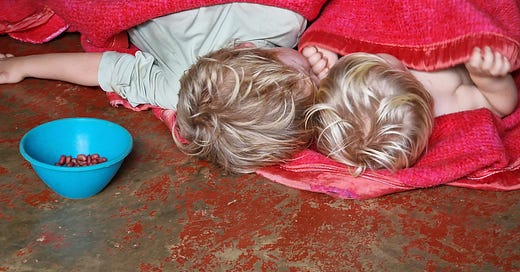


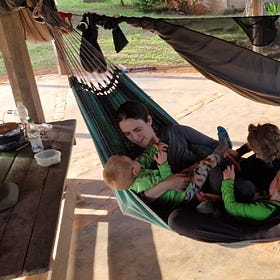

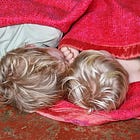
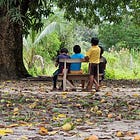

Great read!
So interesting! I already do several of these things because I had a sense that the perfect sleep environment was ultimately unhelpful (and also I didn’t want to be chained to it). I’m definitely going to work in the others if I can.
Also, while reading, I thought of my husband (who had a “normal” late 80s/90s upbringing) and myself (who co-slept and then shared a room with my sister until I was about 10): while I struggle to sleep in very cold or very hot rooms, my husband is way more sensitive to the sleep environment, and also struggles with insomnia more.